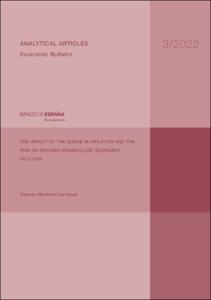Registro completo de metadatos
| Campo DC | Valor |
|---|---|
| dc.contributor.author | Martínez Carrascal, Carmen |
| dc.coverage.spatial | España |
| dc.date.accessioned | 2022-09-08T19:02:38Z |
| dc.date.available | 2022-09-08T19:02:38Z |
| dc.date.issued | 2022-08-09 |
| dc.identifier.uri | https://repositorio.bde.es/handle/123456789/23110 |
| dc.description | Artículo de revista |
| dc.description.abstract | This article examines the impact that some recent events (specifically, the surge in inflation rates and the war in Ukraine) are having on Spanish households’ economic expectations, using information from the European Central Bank’s Consumer Expectations Survey. The analysis shows that the upward revision to household inflation expectations since mid-2021 has fed into their nominal spending expectations, which had been on an upward trajectory until the outbreak of the war. Indeed, the war has significantly impacted the expectations for the determinants of household spending: households now expect their income, their financial situation and the general economic situation to fare worse than before the war. Against a backdrop of greater projected price growth, the interruption of the upward trend observed in prior months of household expectations for an increase in nominal spending (with a downward adjustment, in particular, to the projected spending on durables) would entail weaker spending in real terms. In addition, the gap between the forecast growth of nominal spending and that of income has widened since early 2022. Accordingly, households appear to be implicitly anticipating slightly lower saving rates. The analysis also shows that, in response to higher nominal spending on energy consumed in the home, households with a modest liquidity buffer have reduced their spending on other goods. These households are mostly low-income ones which are also more exposed to changes in energy prices, given that the energy bill absorbs a greater proportion of their income. By contrast, households with a larger liquidity buffer have not significantly changed their levels of spending on other items, which they have funded by temporarily reducing their saving rates. |
| dc.format.extent | 14 p. |
| dc.language.iso | en |
| dc.publisher | Banco de España |
| dc.relation.ispartof | Economic Bulletin / Banco de España, 3/2022 |
| dc.relation.hasversion | Versión en español 123456789/22924 |
| dc.rights | Reconocimiento-NoComercial-CompartirIgual 4.0 Internacional (CC BY-NC-SA 4.0) |
| dc.rights | In Copyright - Non Commercial Use Permitted |
| dc.rights.uri | https://creativecommons.org/licenses/by-nc-sa/4.0/deed.es_ES |
| dc.rights.uri | http://rightsstatements.org/vocab/InC-NC/1.0/ |
| dc.subject | Spending |
| dc.subject | Inflation |
| dc.subject | Expectations |
| dc.subject | War in Ukraine |
| dc.subject | Structural Analysis |
| dc.subject | Economic Situation |
| dc.title | The impact of the surge in inflation and the war on Spanish households’ economic outlook |
| dc.type | Artículo |
| dc.identifier.bdebib | 000473301 |
| dc.identifier.bdepub | ECBU-2022-3B-art24 |
| dc.subject.bde | Renta, empleo y precios |
| dc.subject.bde | Economía del consumo y del ahorro |
| dc.publisher.bde | Madrid : Banco de España, 2022 |
| dc.subject.jel | D12 |
| dc.subject.jel | E21 |
| dc.subject.jel | P24 |












